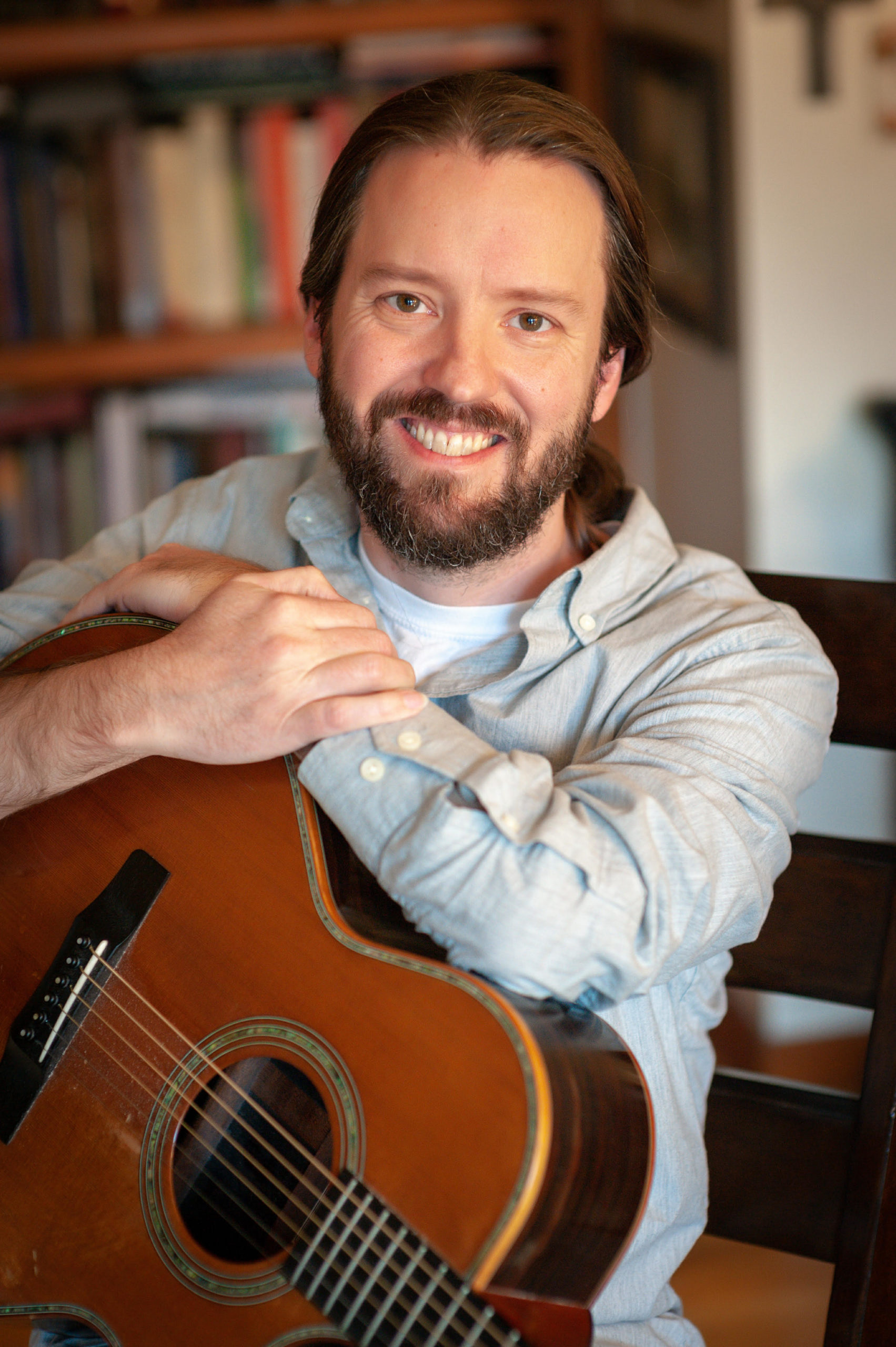“They return at evening,
snarling like dogs,
and prowl about the city.
They wander about for food
and howl if not satisfied.
But I will sing of your strength,
in the morning I will sing of your love…”
From Psalm 59
“They howl… but I will sing.”
That line from Psalm 59 caught my attention one morning a few weeks ago. I was reading in my usual spot: the big brown chair that belonged to my Grandaddy Sam and Grandmother Mal. My friend Nicole Kelley would be arriving that morning to work on songwriting for her new album around my kitchen table. When she arrived, I said, “I’ve got to tell you about this thing I read in the psalms about singing.”
The juxtaposition of those two words “howl” and “sing” in this psalm set me to thinking about my own heart’s response to God. Here are the wicked prowling, snarling, and wandering as the dark descends upon the city, and they cannot find any satisfaction; their appetites are never satiated. So, they howl. That’s one response to God. But the psalmist makes it clear that we have a choice to make, and he sets the wise example. Our psalmist will choose, instead, to sing.
Choosing to sing is the appropriate rebuttal to evil in the world. When we come up against prowling, snarling, wandering and howling, what can we do? We can make a song of gratitude to God for the enduring reality of his purity and love.
I like the word enduring. It means durable. What can withstand the incessant battering of evil across the aeons in this world? When everything is blowing apart and everyone else is caving in, who will keep goodness alive? Who will preserve, untainted, an image of cleanness for future generations. God can endure anything and remain uncorrupted. His love is utterly durable.
That means the song can go on. Amidst all the fume and fog of this world, a clean, sweet air endures. Blessed be the Holy One.
Speaking of holiness, that’s a great source of hope for us. Holiness is God’s impregnable purity. Holiness means God is absolutely committed to keeping the dream of innocence alive and real for those who hope in him. The life we lost still exists somewhere, in God. Muggeridge said sin is the most debated and the most empirically verifiable reality; maybe purity is rarely debated, since there’s so little evidence for it. But it has not perished; purity is alive and well in the Kingdom of God. That treasure is unspoiled, kept in heaven for us, no matter what the howlers say.
I heard Peter Leithart say in an interview the other day that gratitude has a sanctifying effect. When we offer back to God in gratitude some good gift he’s given, our thanks, in effect, acknowledge the goodness God has invested in that gift as an abiding property of the thing. When we say thank you for an orange, or a cypress tree, or a toddler we are opening our eyes to the goodness of that thing and we’re connecting the dots: this goodness I see was put here by God! That goodness then has a particular shape to it, doesn’t it? It’s not abstract or chaotic, it’s full of intention and purpose. When we give thanks, we’re detecting the purpose God placed there in the world for our gladness.
But Leithart goes further, he says that as we detect the properties of goodness, our giving thanks means that we are aligning ourselves with those properties too. We’re saying, “This is good, I like it, and I want to be like this.” The goodness of God is an enduring holiness, and when we choose to sing instead of snarl, we enter a little bit more into God’s holiness. Gratitude has a sanctifying effect. It’s a deliberate practice of seeing, caring about, and learning to participate in good things, and it makes the sweet airs of heaven discernable.
Along those same lines, Alexander Schmemann says that the Eucharist makes us competent. I wasn’t aware that competency has to do with alignment or agreement, not ability. You’re competent to go grocery shopping because we’ve agreed on a grocery list. It’s not really about talent or proficiency, it’s about coming to terms with regard to a shared vision. Schmemann says that, among other things, the Lord’s Table is where we acknowledge through gratitude the goodness of God’s ways, and say again, “This is good, I like it, I want to be like this too.” It’s where we sign on the dotted line, and agree to live life according to God’s good terms. Or, another way of putting it – we say “Amen” to God; or, like Mary, “may it be unto me according to your word.”
Can I be honest though? I like snarling and howling. Griping can offer a strange kind of pleasure. Proverbs says gossip goes down like a piece of sweet candy; complaining, for me, feels good like scratching a poison ivy rash. But when I “scratch the itch” I’m making it harder and harder for the skin to heal. Ingratitude massages my pride and simulates a sense of control over circumstances and people. Snarling feels safe.
Gratitude, on the other hand, feels risky.
When the wolves have circled and all you can hear is a storm of howling, lifting your voice with a song of gratitude can feel idiotic to say the least. It may even feel like lying. In fact, it will feel dishonest if we think innocence and naivete are identical. God is innocent; He is not naive. God’s purity and goodness include the capacity for sorrow and grief. To sing, then, is not to escape into a pretend world, as if there is no such thing as unjust suffering. Our gratitude has the capacity to acknowledge God’s presence with us in our suffering, in other words, we thank a Christ crucified. We partake of a Bread that was broken. Or, as one liturgy puts it,
“at the grave we make our song.”
Gratitude also feels risky or foolish because it is an act of faith. Worthwhile risk, though, is invigorating, and faith is not based on nothing. God’s foolishness is the basis of our faith. St. Francis was called “Le Jongleur de Dieu”, which means something like court jester, juggler, or even tumbler of God. He was nearly silly with gratitude, happy to play the fool in light of the love he’d discovered in Jesus. There is a kind of invigorating adventure that giving thanks makes possible, and it means looking a fool as we sing of enduring love in the midst of a world reduced, in its faithlessness, to mere cynical sarcastic snarls.
This is the world Jesus was born into: a fuming swirl of growls and howling. His tender shoot sprung up in the cold of night, like a glittering star against the black. He is the song swaddled in the feed trough – the one place the wolves failed to look for food. The little bun-in-the-oven who would become the Bread of Life for the world. In some ways, Advent marks the swelling tide of chaos at the end of which the waters miraculously part and a little child appears walking bravely across carrying the lost tune of our lost home. This Child will teach us to sing again. He will teach a song both old and new.
A light is lit, but not just to be shoved under a covering. The property of light’s gift is to shine; it is proper to open our eyes to it and give thanks. There’s an ancient Easter hymn, “Hail, Gladdening Light”, and it goes like this:
Hail Gladdening Light, of His pure glory poured,
who is the immortal Father, heavenly blessed.
Holiest of Holies, Jesus Christ, our Lord.
Now we are come to the Sun’s hour of rest.
The lights of evening round us shine.
We hymn the Father, Son and Holy Spirit divine.
Worthiest art thou, at all times to be sung, with undefiled tongue.
Son of our God, giver of life alone.
Therefore in all the world, thy glories, thy glories Lord, they own.
It was fun to me to discover that the word glad in its ancient roots meant “to shine”. “On those living in the land of deep darkness a light has dawned,” says Isaiah. In the midst of the darkness, our holy God ignites the light of his face in Jesus. He gladdens the world, brightening our faces with a holy joy.
Meanwhile, the snarlers snarl and the howlers howl, and find no relief for their hunger. But in a world starved for the hope of holiness, a grateful people rise at the very graveside of human innocence and make a merry song.
The fabulous featured image is courtesy of Photo by Greg Rakozy on Unsplash.
Note from Matthew Clark: “If you’d like to hear the whole conversation between Peter Leithart and Ken Myers on gratitude’s sanctifying effect, it’s available here (https://marshillaudio.org/
Matthew Clark is a singer/songwriter and storyteller from Mississippi. He has recorded several full length albums, including a Bible walk-through called “Bright Came the Word from His Mouth” and “Beautiful Secret Life.” Matthew’s current project, “The Well Trilogy,” consists of 3 full-length album/book combos releasing over 3 years. Each installment is made up of 11 songs and a companion book of 13 essays written by a variety of contributors exploring themes around encountering Jesus, faith-keeping, and the return of Christ. Part One, “Only the Lover Sings” is available both as an album and as a companion book.
Matthew also hosts a weekly podcast, “One Thousand Words – Stories on the Way,” featuring essays reflecting on faith-keeping. A touring musician and speaker, Matthew travels sharing songs and stories in a van called Vandalf.
Leave a Reply
A Field Guide to Cultivating ~ Essentials to Cultivating a Whole Life, Rooted in Christ, and Flourishing in Fellowship
Enjoy our gift to you as our Welcome to Cultivating! Discover the purpose of The Cultivating Project, and how you might find a "What, you too?" experience here with this fellowship of makers!


Matthew, beautifully captured and conveyed–to sing above the howl. When I sing I have to remind my children that I am making a “joyful” noise unto the Lord–to Him it’s a sweet melody. I am reminded of Corrie ten Boom and her sister in the concentration camps during the Nazi regimes in Europe–how in the midst of great injustice and persecution they raised a song of praise and practiced gratitude. #inChristalone
This fed my soul!
Thank you ,thank you, thank you.
To sing when others may snarl… amen!
“faith is not based on nothing”
Amen to that too!
Thank you, Mary! Yeah, this Fall I saw a reading of Pete Peterson’s “The Hiding Place”. It was very moving. Thanks for reading!
I just finished listening to “Hail Gladdening Light.” Thank you for sharing it, and all of these thoughts, with us. As a once-inveterate snarler who has been learning to sing, I need these reminders.
And that paragraph that starts with “This is the world Jesus was born into”…every word of that is luminous. If I was ever going to start a weird cult, we’d all get that tattooed on our bodies.